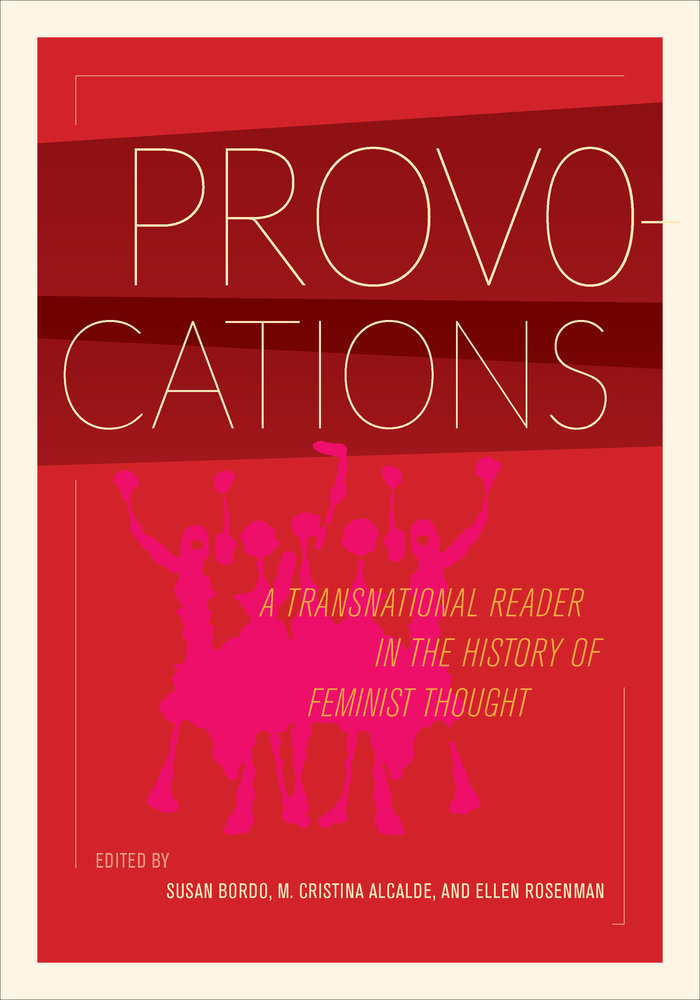 Provocations: A Transnational Reader in the History of Feminist Thought Provocations: A Transnational Reader in the History of Feminist Thought
University of California Press, 2015
Ellen Rosenman
The first collection of its kind, Provocations: A Transnational Reader in the History of Feminist Thought is historically organized and transnational in scope, highlighting key ideas, transformative moments, and feminist conversations across national and cultural borders. Emphasizing feminist cross-talk, transnational collaborations and influences, and cultural differences in context, this anthology heralds a new approach to studying feminist history.
Provocations includes engaging, historically significant primary sources by writers of many nationalities in numerous genres—from political manifestos to theoretical and cultural analysis to poetry and fiction. These texts range from those of classical antiquity to others composed during the Arab Spring and represent Asia, the Middle East, Latin America, Western Europe, and the United States. Each section begins with an introductory essay that presents central ideas and explores connections among readings, placing them in historical, national, and intellectual contexts and concluding with questions for discussion and reflection.
|
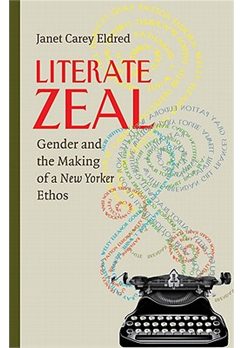 Literate Zeal: Gender and the Making of a New Yorker Ethos Literate Zeal: Gender and the Making of a New Yorker Ethos
University of Pittsburgh Press, 2012
Janet Eldred
Dr. Eldred examines the rise of women magazine editors during the mid-twentieth century and reveals their unheralded role in creating a literary aesthetic for the American public.
|
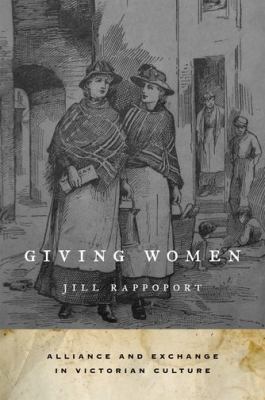 Giving Women: Alliance and Exchange in Victorian Culture Giving Women: Alliance and Exchange in Victorian Culture
Oxford University Press, 2012
Jill Rappoport
Giving Women examines the literary expression and cultural consequences of English women's giving from the 1820s to the First World War. Attending to the dynamic action and reaction of gift exchange in fiction and poetry by Charlotte Brontë, Elizabeth Barrett Browning, Elizabeth Gaskell, and Christina Rossetti as well as in literary annuals, Salvation Army periodicals, and political pamphlets, Rappoport demonstrates how female authors and fictional protagonists alike mobilized networks outside of marriage and the market. Through giving, women redefined the primary allegiances of their everyday lives, forged public coalitions, and advanced campaigns for abolition, slum reform, eugenics, and suffrage.
|
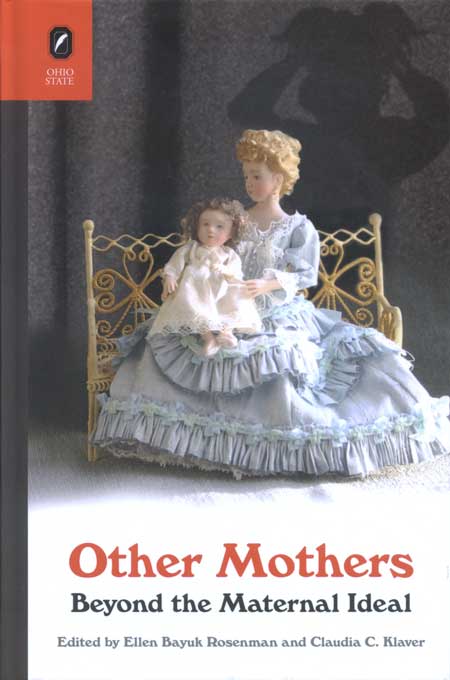 Other Mothers: Beyond the Maternal Ideal Other Mothers: Beyond the Maternal Ideal
The Ohio State University Press, 2008
Ellen Bayuk Rosenman and Claudia C. Klaver
Other Mothers, edited by Ellen Bayuk Rosenman and Claudia C. Klaver, offers a range of essays that open a conversation about Victorian motherhood as a wide-ranging, distinctive experience and idea. In spite of its importance, however, it is one of the least-studied aspects of the Victorian era, subsumed under discussions of femininity and domesticity.
This collection addresses that void and reveals the extraordinary diversity of Victorian motherhood. Exploring diaries, novels, and court cases, with contexts ranging from London to Egypt to Australia, these varied accounts take the collection “beyond the maternal ideal” to consider the multiple, unpredictable ways in which motherhood was experienced and imagined in this formative historical period.
|
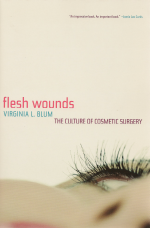 Flesh Wounds: The Culture of Cosmetic Surgery Flesh Wounds: The Culture of Cosmetic Surgery
University of California Press, 2003
Virginia L. Blum
When did cosmetic surgery become a common practice, the stuff of everyday conversation? In a work that combines a provocative ethnography of plastic surgery and a penetrating analysis of beauty and feminism, Virginia L. Blum searches out the social conditions and imperatives that have made ours a culture of cosmetic surgery. From diverse viewpoints, ranging from cosmetic surgery patient to feminist cultural critic, she looks into the realities and fantasies that have made physical malleability an essential part of our modern-day identity.
|
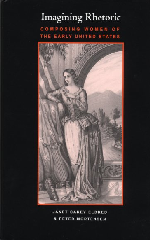 Imagining Rhetoric: Composing Women of the Early United States Imagining Rhetoric: Composing Women of the Early United States
Pittsburgh University Press, 2002
Janet Carey Eldred
and Peter Mortensen
This book examines how women's writing developed in the decades between the American Revolution and the Civil War and how women imagined using their education to further the civic aims of an idealistic new nation.
|
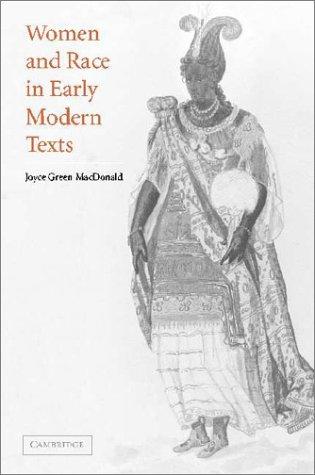 Women and Race in Early Modern Texts Women and Race in Early Modern Texts
Cambridge University Press, 2002
Joyce Green MacDonald
Joyce Green MacDonald discusses the links between women's racial, sexual, and civic identities in early modern texts. She examines the scarcity of African women in English plays of the sixteenth and seventeenth centuries, the racial identity of the women in the drama and also that of the women who watched and sometimes wrote the plays. The coverage also includes texts from the late fourteenth to the early eighteenth centuries, by, among others, Shakespeare, Jonson, Davenant, the Countess of Pembroke and Aphra Behn.
|
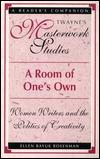 A Room of One's Own: A Reader's Companion A Room of One's Own: A Reader's Companion
Twayne's Masterwork Studies: Women Writers and the Politics of Creativity
Twayne Publishers, 1995
Ellen Bayuk Rosenman
In a broad sense, Rosenman points out, A Room of One's Own analyzes the constraints on women's achievement--the hostile environment in which they write--and the responses, both creative and self-defeating, that this environment provokes. As she follows the essay's analysis of patriarchy and feminism, she also pays special attention to the essay as a novel, showing how the twists and turns of Woolf's narrative resemble experimental literary techniques.
|
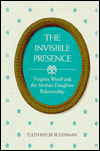 The Invisible Presence: Virginia Woolf and the Mother-Daughter Relationship The Invisible Presence: Virginia Woolf and the Mother-Daughter Relationship
Lousiana State University Press, 1986
Ellen Bayuk Rosenman
In both theme and technique, Woolf's writing reflects an ambivalent, obsessive relationship with her remarkable mother, Julia Duckworth Stephen. Rosenman employs psychoanalytic perspectives that focus on the mother-daughter relationship as the source and center of female identity, and feminist literary criticism that explores the role of the woman writer in a male-dominated culture. The mother-daughter relationship informed many aspects of her work, including narrative structure and characterization as well as the thematic issues of sexual politics, romantic and familial love, literary inheritance, and the role of the woman writer.
|
|